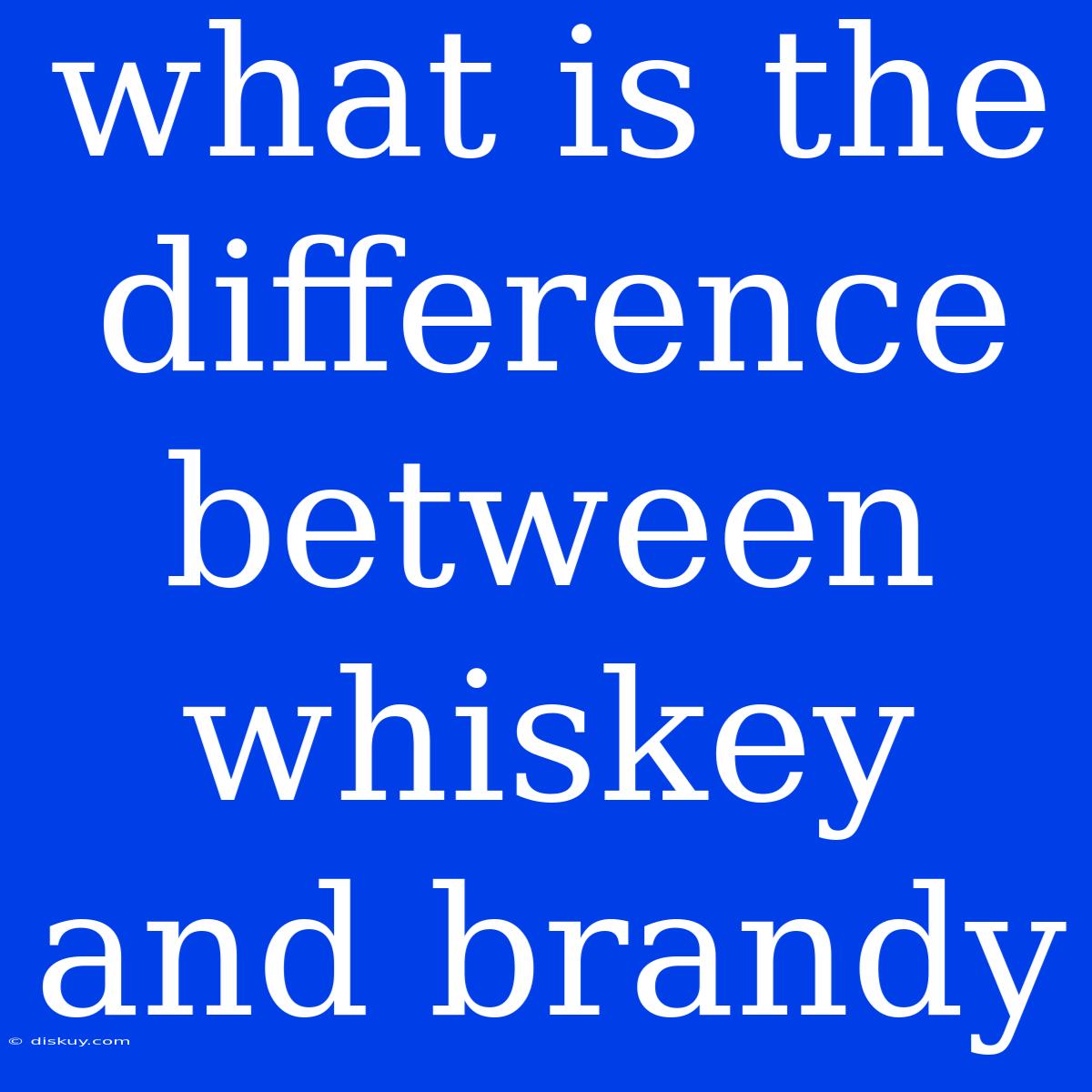What's the Difference Between Whiskey and Brandy? Unmasking the Secrets of Two Beloved Spirits
Whisky and brandy, both cherished spirits with rich histories, often confuse even seasoned drinkers. While both are enjoyed neat, on the rocks, or as a base for cocktails, their distinct origins and production processes result in unique flavor profiles. This article dives deep into the world of whiskey and brandy, unveiling the secrets behind these iconic beverages.
Editor Note: Whisky and Brandy are enjoyed globally, offering a range of flavors and experiences. Understanding the differences between these spirits allows for a deeper appreciation of their individual nuances and allows you to make informed choices when selecting a spirit for your next drink.
This exploration delves into the fascinating world of whiskey and brandy, revealing the nuances that set them apart. We'll uncover the intricacies of their production methods, ingredient variations, and the resulting flavor profiles. You'll gain valuable insights that equip you to confidently choose the right spirit for your preferences and enjoy a deeper appreciation of these timeless classics.
Understanding the Production Processes and Ingredients:
| Category | Whiskey | Brandy |
|---|---|---|
| Base | Fermented mash of grains (barley, rye, corn, wheat) | Fermented fruit juice, predominantly grape juice |
| Distillation | Multiple distillations using pot stills or column stills | Single or double distillation using pot stills |
| Aging | Typically aged in charred oak barrels for a minimum of 2 years (varies by region/type) | Aged in oak barrels, sometimes previously used for whiskey or wine (varies by region/type) |
| Flavor Profile | Complex and varied, ranging from smoky and peaty to sweet and fruity | Fruity, smooth, and often complex with notes of dried fruit, spices, and oak |
Whisky:
Introduction: Whisky, a spirit loved for its complexity and depth, is a result of a carefully crafted process. It's the product of fermenting a mash of grains, usually barley, rye, corn, or wheat, followed by distillation. The diverse nature of whisky lies in the grains used, the region of origin, the aging process, and the type of distillation.
Key Aspects:
- Grain: The primary grain dictates the whisky's flavor profile. Barley is the most common, resulting in robust flavors, while rye brings spice and spice.
- Region: Each region has its unique production methods, resulting in distinct characteristics. Scotch whisky is known for its smoky peatiness, while American bourbon boasts a sweet corn-forward profile.
- Distillation: Pot stills produce a more flavorful whisky, while column stills create a smoother, cleaner spirit.
- Aging: Aging in charred oak barrels imparts color, complexity, and subtle flavors.
Discussion: Whisky, with its diverse origins and production methods, offers a world of flavor exploration. From the smoky peatiness of Scotch to the smooth sweetness of American bourbon, each whisky type boasts unique character. The choice of grain, the region of origin, and the aging process all contribute to the final flavor profile, making whisky a fascinating and nuanced spirit.
Brandy:
Introduction: Brandy, the spirit distilled from fermented fruit juice, predominantly grapes, is renowned for its smooth, fruity notes. It's a spirit with a rich history, often associated with elegance and sophistication. The key to brandy lies in the type of grape used, the distillation process, and the aging period.
Key Aspects:
- Grape: The grape variety significantly impacts the brandy's flavor profile. Common grapes include Grenache, Tempranillo, and Sauvignon Blanc.
- Distillation: Brandy is typically distilled once or twice in pot stills, creating a more concentrated and flavorful spirit.
- Aging: Aging in oak barrels imparts color, complexity, and distinctive flavors. Brandy can age for years, developing deeper complexity with time.
Discussion: Brandy offers a unique spectrum of flavors that reflect its fruit-based origin. The smooth and mellow nature of brandy is often accompanied by notes of dried fruit, spices, and oak, creating a complex yet elegant flavor profile. From the full-bodied cognacs of France to the fruity Spanish brandies, each region brings its distinct character to the table.
FAQ about Whisky and Brandy:
Introduction: This section addresses common questions regarding whisky and brandy, offering clarification and insights.
Questions:
- Q: What is the difference in alcohol content between whisky and brandy?
- A: Both whisky and brandy typically range from 40% to 60% alcohol by volume (ABV), though specific brands and types may vary.
- Q: Can I drink brandy and whisky neat?
- A: Yes, both spirits are traditionally enjoyed neat, allowing the full complexity of flavors to shine through.
- Q: Are there different types of brandy?
- A: Yes, brandy encompasses a wide range of styles. Cognac, Armagnac, and Spanish brandy are just a few examples.
- Q: What are some popular cocktails made with whisky and brandy?
- A: Popular whisky cocktails include the Old Fashioned, Manhattan, and Whiskey Sour. Brandy cocktails often feature the Sidecar and Brandy Alexander.
- Q: Which is better, whisky or brandy?
- A: There is no "better" spirit. The choice depends on personal preference, as both offer distinct flavor profiles.
- Q: Can I age brandy or whisky at home?
- A: While aging can impact the flavor profile, it's not recommended to age spirits at home due to the risk of spoilage and potential chemical reactions.
Summary: Whisky and brandy, two beloved spirits with rich histories, offer distinct flavor profiles due to their unique production methods and ingredients. Whisky, a grain-based spirit, boasts complexity and depth, while brandy, distilled from fermented fruit juice, showcases smooth, fruity notes. Both provide a diverse range of styles, making them fascinating spirits to explore and enjoy.
Closing Message: Understanding the differences between whisky and brandy unveils a world of flavor exploration. Whether you're a seasoned connoisseur or just starting your journey into the world of spirits, appreciating the nuances of each spirit enriches the drinking experience and allows you to make informed choices. So raise a glass to these iconic beverages and savor the unique characteristics that make them so cherished.

